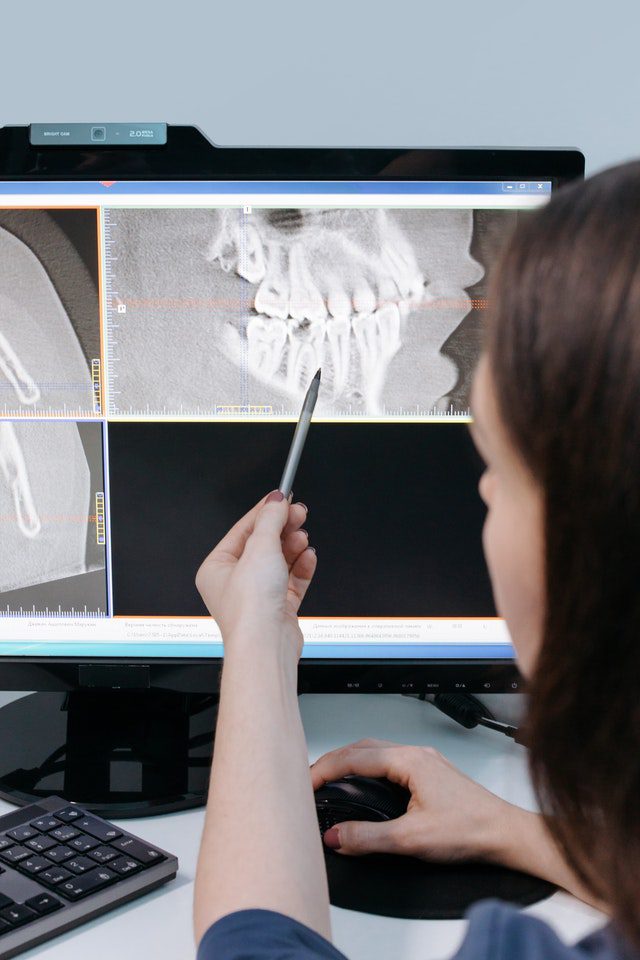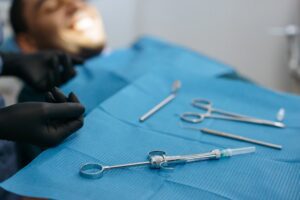Having a healthy jaw and mouth isn’t just about teeth and gums. Your jaws play an integral part in almost everything you do, every day, all day. So what happens when an issue with your jaw – whether it’s a severe overbite or a fracture from an accident – is damaged or malformed to the point that it interferes with your quality of life?
Oral and maxillofacial surgeons focus in conditions of the upper (maxilla) and lower (mandible) jaws. They’re the specialists you go to when your child is born with a cleft palette or when cancer has ruined the bone in your jaw(s). Medically referred to as orthognathic surgeries, surgical intervention for conditions of the jaw are often long-term treatments plans with several surgeries, not just one.
Let’s take a look at some common conditions of the jaw and how maxillofacial surgeons restore the position and function of a patient’s jaws.
Congenital Jaw Pathologies that Require Maxillofacial Surgery
When a condition is congenital, it means it is something that person was born with. Some congenital jaw problems are pretty common and can often be corrected with orthodontia. However, some require maxillofacial procedures because they interfere with or are dangerous to the person’s quality of life.
Cleft Lip/Palate
Also referred to as orofacial clefts, these conditions are a result of poor or irregular fetal development. Babies born with cleft lips or palates might have poor health, be susceptible to ear and throat infections, have trouble breastfeeding, or even breathing normally. Maxillofacial surgeons intervene at an early age to bridge the cleft so the child’s jaw will develop more normally.
Mandibular Hypoplasia
This condition can be caused by genetics or as a result of FAS, and is often co-occurring with other congenital issues like progeria, for instance. In this disorder, the child’s lower jaw is disproportionately small and shallow, as compared to the rest of the face. This can make an infant unable to eat or breathe properly. It is usually corrected by oral surgeries that move and supplement the lower jaw.
Openbite
This is when your mouth is closed but most of your teeth don’t touch, and causes issues with speaking and eating. Maxillofacial surgeons often work with orthodontists on long-term treatment plans that reduce the height of one or both jaws and adjust the bite until it fits together correctly.
Over & Underbites
Most of the time, overbites and underbites are, to some extent, harmless. But occasionally children are born with extreme overbites or underbites that interfere with breathing, eating, speaking, and result in poor dental development. Maxillofacial surgeons intervene by moving the position of the lower jaw until it sits at a more desirable position.
Medical Conditions that Contribute to Jaw Problems
Some medical conditions can cause issues with your jaw. Perhaps the most well-known is TMJ, a condition of the temporomandibular joint (read: your jaws’ hinges) that causes pain in the jaw, face and neck. The jaw might also pop when it moves, and it may sometimes lock, making you unable to open or close your mouth for a period of time. Oral surgeries to correct TMJ range from minimally-invasive joint cleaning and lubrication to open-joint surgery that replaces part or all of the joint.
Other medical conditions that cause jaw pathologies are bone and joint damage resulting from conditions like osteoarthritis or diabetes, jawbone infections, or osteonecrosis from cancer treatments. Depending on the problem and the extent of the damage, a maxillofacial surgeon may remove unhealthy bone in the jaw or even entire sections. These might later be reconstructed via surgical installation of oral prosthetics.
Restorative Jaw Surgeries for Facial Trauma
Maxillofacial surgeons who deal with traumatic injuries to the face and jaw approach corrective surgery differently, mainly because before the accident, there was nothing wrong with the jaw, so reconstructing the mouth after facial trauma is more like putting a broken pot back together than correcting something that was made poorly in the first place.
Facial trauma surgeons often work closely with other specialists, like plastic surgeons and ear, nose and throat doctors. These maxillofacial surgeries are often invasive, with multiple reconstructive procedures, bone grafting, and long healing time between each. When you see someone’s jaw wired together, it’s often a sign it’s recently been broken and an oral surgeon has “splinted” it after surgery so it stays in place as it heals.
Technology in oral and maxillofacial medicine has come a long way in a short time, making it so, whether you’ve had a bad accident, or just the bad luck of being born with a jaw disorder, oral surgeons can help you get the quality of life and level of wellness that we all deserve.










